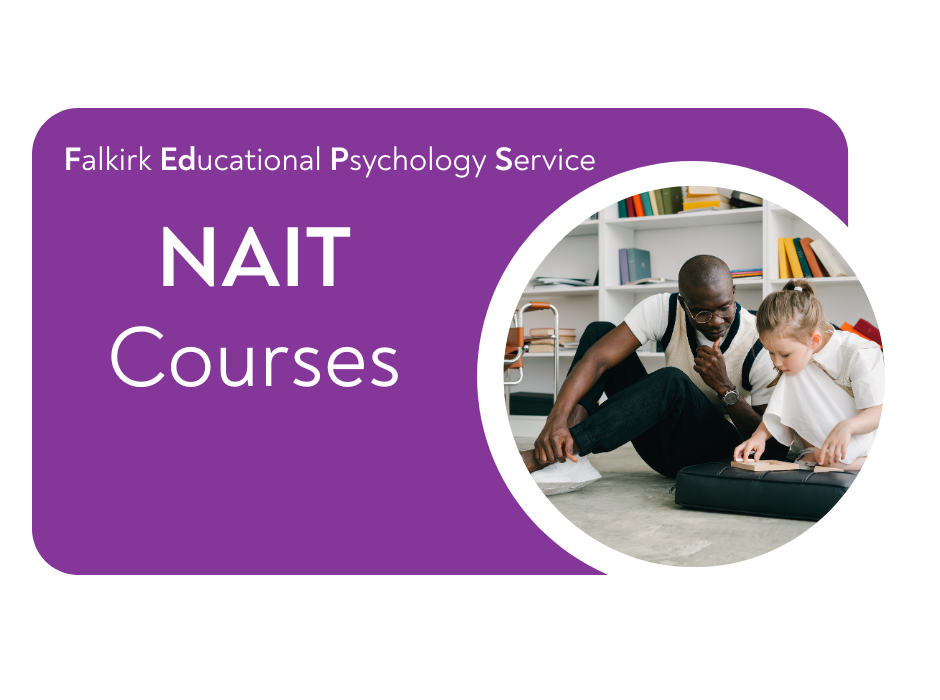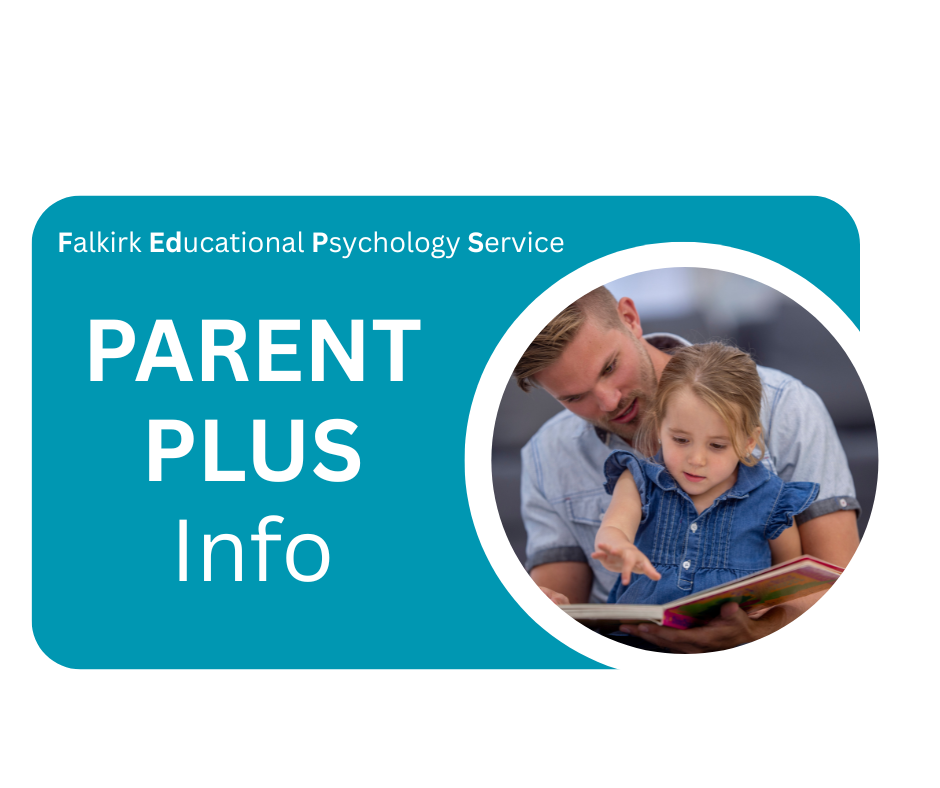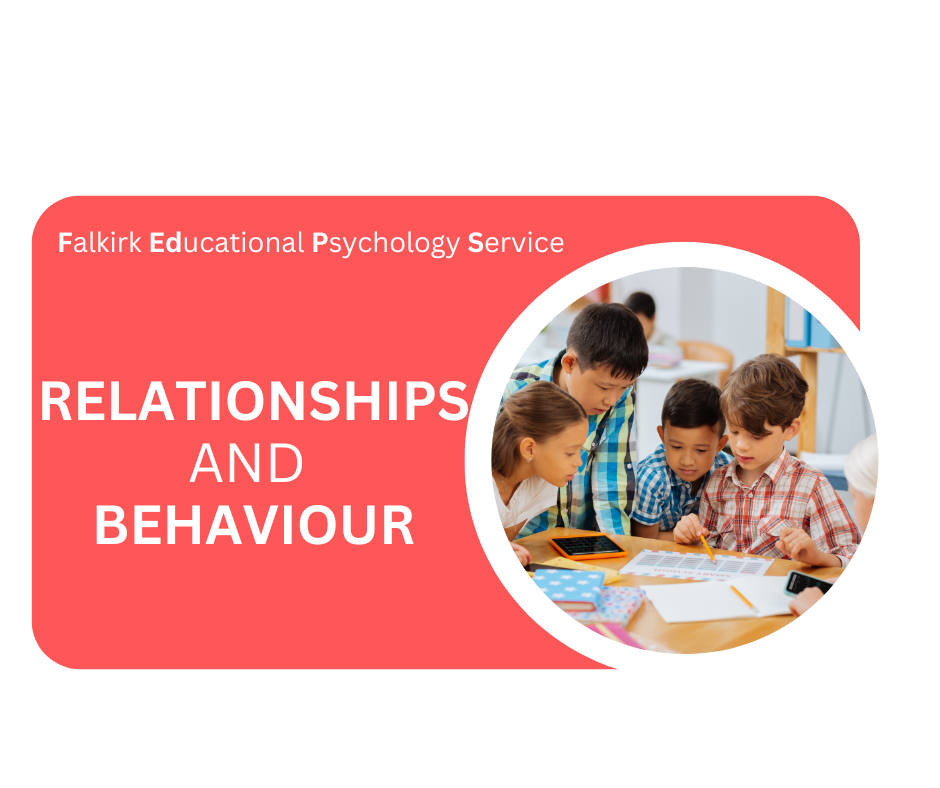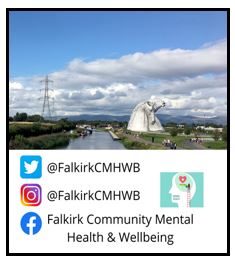A new video guide created by Falkirk Educational Psychology Service can be accessed here. The new resource provides a walk through video focusing on our recently developed Promoting Relationships and Behaviour in Falkirk Schools Guide.
Author: Eoin Keane
NEurodivergent peer Support Toolkit
NEST (NEurodivergent peer Support Toolkit) is a suite of materials to facilitate peer support for neurodivergent young people in mainstream secondary schools. The toolkit has been co-created by researchers at the University of Edinburgh, neurodivergent young people and a neurodiverse group of adults who work with neurodivergent young people.
NEST Hub – NDD Website
A wide range of useful resources and helpful videos can be found on the nest website. NEST is a Neurodevelopment Empowering and Strategy Team funded by NHS Ayrshire Health and Social Care Partnership. The website provides practical information to help neurodivergent people with daily challenges.

NAIT Autism Training
There are still places on our NAIT Autism training for primary school practitioners. The training will be delivered both online and in-person. There are four sessions between November-May 2026. Sign up through CPD Manager. More details can be found on the flyer.

Parents Plus Information
Parents Plus programmes support parents/carers of children aged 2-6. The 8-week practical programme draws on parents’ strengths. There is lots of great opportunities to share tips and learn new strategies. You can find information about this year’s Early Level Parents Plus programmes here.

Relationships and Behaviour
Education Scotland has produced a range of materials which are designed to provide research, guidance, support, professional learning, exemplification and advice to practitioners in education for improving relationships and behaviour within their context – Improving relationships and behaviour.
Materials and Practice Guides – T
Those affected by war and conflict or seeking refuge
Scottish Government (2022). Ukraine Psychological Wellbeing Advice Pack – Guidance for Services.
Beacon House (2022). Information for families seeking refuge from war or conflict in their home country. (Available in English, Russian Ukrainian)
Children who have parents in the Armed Forces – Forces Children’s Education website; Forces Children’s Education (November 2021). Supporting Armed forces families in Scotland: Teacher Toolkit.
Transgender
Supporting transgender young people in Scottish schools guidance (Scottish Government, August 2021)
Materials and Practice Guides – S
Selective Mutism
The Educational Psychology Services of Aberdeenshire Council and Aberdeen City Council produced guidance with health partners that we recommend for school based practitioners who work with children who have or may have selective mutism.
Self Regulation
Sensory Barriers to Learning
- Forth Valley Sensory Centre
- Scottish Sensory Centre webpages
- Making Sense of Sensory Behaviour – Falkirk Council, Children with Disabilities Team’s Occupational Therapists
Severe and Complex Learning Needs
- Low Arousal Approach to behaviour,
- the Star Analysis framework for analysing behaviour
- An introduction to Positive Behaviour Support.
- A useful framework for practitioners supporting pupils with severe and complex learning needs was developed by South Lanarkshire and can be referred to on their website by clicking on the link.
- NICE offer useful guidance on supporting challenging behaviour and children, young people and adults with learning difficulties.
CALL Scotland (Communication, Access, Literacy & Learning) based at the University of Edinburgh have a range of materials to help children and young people across Scotland to overcome disability and barriers to learning including assisting with:
- Android Apps for Complex Communication Support Needs,
- iPad Apps for Complex Communication Support Needs,
- iPad Apps for Learners with Complex Additional Support Needs,
- Eye Gaze Software Curve, Eye Gaze Setup Guide
- AAC Modules (aacscotland.org.uk)
- Symbols for all
Communication Matters has access to resources, research and a support forum for practitioners who support learners with significant communication needs, including those who use alternative and augmentative communication approaches.
Sexualised Behaviour – Guidance
- Forth Valley Guidance – Preventing and Managing Harmful Sexual Behaviour
- Scottish Government (2020). Harmful sexual behaviour by children and young people: Expert Group Report.
- The Brook Sexual Behaviours Traffic Light Tool can be used for reference as a helpful tool.
- Please also consider – Child Protection – Forth Valley Practitioner Pages.
Social Skills
Solution Oriented Approaches
Speech and Language Therapy Service
Symbols and visuals
Symbols for all (part of CALL Scotland) have a wealth of Boardmaker visuals organised over curricular and environmental categories to assist learners understanding and communication.
Materials and Practice Guides – O
Occupational Therapy Service
Offending
Supporting learners who offend or are at risk of offending
Disclosure: What educational practitioners should know
Children and Young People’s Centre for Justice website including updates on age of criminal responsibility
Online safety
Education Scotland (2022). Cyber First Aid Box (Digilearn). The site will ask a series of questions to help families determine the best response to a harmful online incident, including how to approach the subject with children & young people, possible solutions, and the first steps to recovering from it.
Materials and Practice Guides – C
Care experienced children and young people
The Independent Care Review (2020) made a number of recommendations, generated The Promise is a commitment to change and re-organise how Scotland thinks, plans and prioritises for children and their families (based on foundations at the heart of this change). ‘Children must be listened to and meaningfully and appropriately involved in decision-making about their care, with all those involved properly listening and responding to what children want and need. There must be a compassionate, caring decision- making culture focused on children and those they trust’ Useful infographics
The Children’s Hearing: What practitioners should know – This resource provides educational practitioners with information about the Children’s Hearing System and resources to help them more effectively support children and families going through this experience.
The Scottish Children’s Reporter Administration (SCRA) (2022) have updated information materials about the role of the Reporter
- New pages on our website for children and young people
- Two cartoon animations – one on the role of the Reporter and another about contacting the Reporter
- An easy read guide for parents and carers
- A BSL video with subtitles and audio
Centre for Excellence for Children’s Care & Protection (CELCIS) Education Forum
Children’s and Young People’s Voices
Falkirk Council Inclusion and Wellbeing Service have produced a booklet to assist conversations with children about the wellbeing indicators and gather their views.
Highland Council (2020) have produced Tools for Gathering the Views of Children and Young People.
Children in Scotland (2022) is working with Education Scotland and the Scottish Government to build knowledge and influence practice development around support for young people with additional support needs in an education setting. Engagement pack available and information about contributing to the project.
Scottish Government (2020) collated access to children and young people’s views, ideas and experiences that have been gathered on a range of topics. If you are planning to engage with children and young people, check for previous engagement on that topic and look at this previous engagement to assist you in considering the different methods that could be used.
NSPCC Learning (2015). Solution-focused practice toolkit. The toolkit provides inspiration for worksheets and activities to use, adapt or devise for the children and young people you work with. The worksheets and activities are designed to be used with children and young people aged 5-19 years old. Ideally for practitioners who already have some training in solution-focused practice.
Child and Adolescent Mental Health Service (CAMHS)
Forth Valley Child and Adolescent Mental Health Service includes CAMHS contact details, information about coming to CAMHS, sources of advice for parents & carers and information about Healios Assessment Services.
ThisMayHelp (NHS) website has a short video and advice called ‘How to prepare for your child’s first CAMHS appointment’
Child Protection
Falkirk Council and Forth Valley child protection policies, procedures & guidelines
Education Scotland have provided Domestic abuse information for educators.
Domestic abuse learning resource for professionals – awareness-raising resource serves as an introduction to domestic abuse and coercive control. The tool provides an overview of the main considerations when responding to domestic abuse, however it does not replace specialist domestic abuse training.
See also sections below: Nurture, Trauma and Adversity & Risk Assessment and Management
Children’s Rights
Education Scotland (2023). Recognising and realising children’s rights: A professional learning resource to promote self-evaluation and improvement planning.
Scottish Government/Parents Club & UNICEF. Your Guide to Children’s Rights and the united nations convention on the rights of the child: A booklet for parents, carers and family members.
Community Mental Health and Wellbeing Services
 Falkirk Community Mental Health and Wellbeing (glowscotland.org.uk)
Falkirk Community Mental Health and Wellbeing (glowscotland.org.uk)
Critical incidents in school communities
UK Trauma Council and Anna Freud National Centre for Children and Families have provided various resources for events that are potentially traumatic and affects a large part or whole of an educational community. The five key principles that can help recovery are safe, calm, connected, in control, hopeful. There are resources for supporting children and adults. The resources are informed by research and best practice to provide a compassionate response to assist children and adults to cope.

